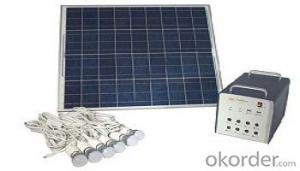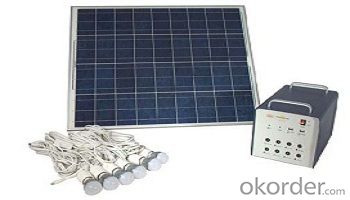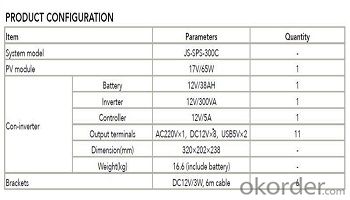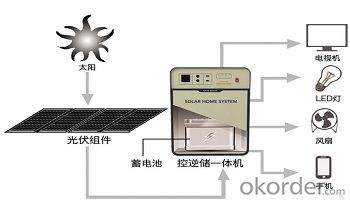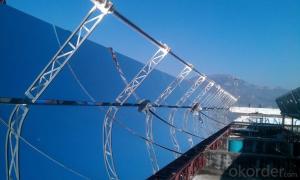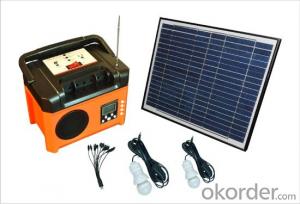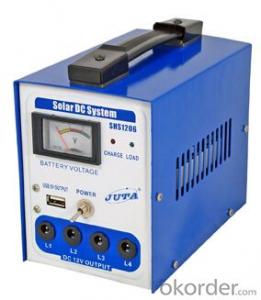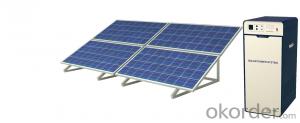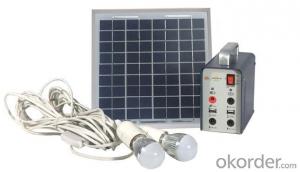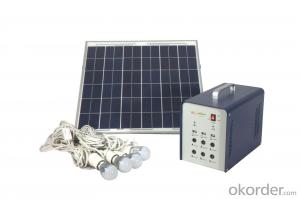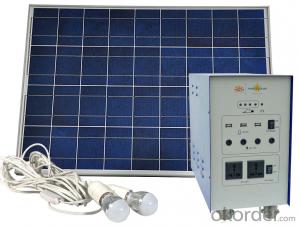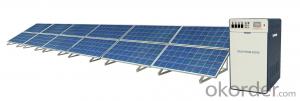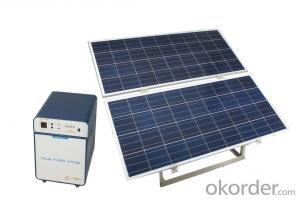Solar Energy Systems Houston:SPS-15 Micro Off Grid Solar System with LED Lighting
- Loading Port:
- China main port
- Payment Terms:
- TT OR LC
- Min Order Qty:
- 10 watt
- Supply Capability:
- 100000 watt/month
OKorder Service Pledge
OKorder Financial Service
You Might Also Like
Product Description:
Name: SPS-15 Micro off Grid Solar System with LED Lighting
Solar power system provides alternating current and direct current, which is produced by the modules transforming solar power into power, to home lighting, household appliance and other DC appliance, such as cell phone and laptop.
Solar power system is widely used in area lack of power, for example house power supplying, monitoring, communication base, fire prevention in forest area, pasture and meadow, aquaculture etc.
Solar DC Lighting System
Multiple protection system, safe and reliable performance.
Integrated and portable design, easy operation.
DC5V, DC12V, AC220V output, wide range application.
Clean engergy, cycle use.
Packaging & Delivery:
Packaging Detail: Quantity of carton :3pcs Color Box size: 28.5*11.5*12187.5px , 2.66kg/pc Carton size: 36.5*31*14375px G.W/N.W: 8.7/8.0 kg
Delivery Detail: 25 working days according to order quantity
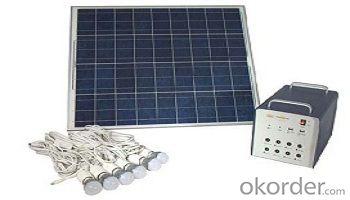
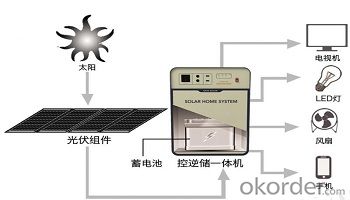
Advantages:
1.Solar Energy&green energy.
2. Easy to install, operate and maintain.
3. Ideal lighting products where normal electric is not convenient.
Packing details:
Quantity of carton :3pcs
Color Box size: 28.5*11.5*12187.5px ,
2.66kg/pc
Carton size: 36.5*31*575cm
G.W/N.W: 8.7/8.0 kg
Our services:
1. Sample: Sample is available. Please send us email about your detail consignee information: name, address, zip code and tel. Then we will contact you and send samples to you.
2. Small order: We can accept small order for this product. Please let us know your order quantity.
3. Customize: We accept OEM service and can customize products as customers' design.
4. After-sales service: We will give customers active feedback within 24hours after receive any of customers' questions
- Q: Can solar energy systems be used for powering drones?
- Yes, solar energy systems can be used to power drones. Solar panels can be mounted on the surface of drones to capture sunlight and convert it into electrical energy, which can then be used to power the drone's motor and other components. This allows drones to operate for longer durations and reduces the need for frequent battery replacements or recharges.
- Q: Can solar energy systems be used in cloudy or rainy climates?
- Yes, solar energy systems can still be used in cloudy or rainy climates. While solar panels generate more electricity under direct sunlight, they can still produce energy on cloudy days or during light rain. However, the energy output may be lower compared to sunny conditions. Additionally, advancements in technology have improved the efficiency of solar panels in capturing diffuse light, making them more suitable for regions with less sunlight.
- Q: What is the impact of solar energy systems on water usage?
- Solar energy systems have a positive impact on water usage due to their inherent nature of generating electricity without the need for water. Traditional forms of electricity generation, such as coal or natural gas power plants, require substantial amounts of water for cooling and steam generation. In contrast, solar energy systems do not rely on water for their operation, making them an environmentally friendly alternative. By utilizing solar energy, we can significantly reduce the water consumption associated with electricity generation. This is particularly crucial in regions facing water scarcity or drought conditions. With solar power, there is no need for water-intensive cooling processes, saving millions of gallons of water annually. Furthermore, solar energy systems can also contribute to water conservation indirectly. As solar power becomes more prevalent, it reduces the demand for fossil fuels, which often require substantial amounts of water for extraction and processing. By transitioning to solar energy, we can lessen the strain on water resources that are used in traditional energy production. Additionally, solar energy systems can be combined with innovative technologies such as solar water heaters, which utilize the sun's energy to heat water for domestic or industrial use. This reduces the reliance on conventional water heaters that consume significant amounts of electricity or gas. Overall, the impact of solar energy systems on water usage is highly beneficial. They reduce water consumption in electricity generation, indirectly conserve water by reducing the demand for fossil fuels, and can even be utilized for water heating purposes. Embracing solar energy helps us mitigate the strain on water resources and move towards a more sustainable future.
- Q: Can solar energy systems be used in powering desalination plants?
- Yes, solar energy systems can be used to power desalination plants. Solar-powered desalination systems use solar panels to convert sunlight into electricity, which is then used to power the desalination process. This sustainable approach not only reduces reliance on fossil fuels but also helps address the water scarcity issue by producing freshwater from seawater in an environmentally friendly manner.
- Q: Can solar energy systems be financed?
- Indeed, solar energy systems can be financed through a variety of options. Financing solar energy systems encompasses loans, leases, and power purchase agreements (PPAs). One prevalent choice for financing is a solar loan, which enables individuals and businesses to borrow funds for the installation of a solar energy system and subsequently repay the loan over time. These loans can be obtained from banks, credit unions, or solar financing companies. Solar loans offer both fixed and variable interest rates, with repayment terms spanning from 5 to 25 years. Another option involves a solar lease, wherein a third-party entity owns the solar energy system, and the homeowner or business pays a monthly lease payment to utilize the system. In this scenario, the third-party assumes responsibility for maintenance, repairs, and system performance. Solar leases frequently involve minimal to no upfront costs and can yield immediate savings on electricity bills. Power purchase agreements (PPAs) represent another popular financing alternative for solar energy systems. Under a PPA, a third-party developer undertakes the installation and upkeep of the solar panels on a customer's property, while the customer commits to purchasing the electricity generated by the system at a predetermined rate. PPAs offer fixed rates for specific periods, enabling customers to secure lower electricity costs and diminish reliance on fossil fuels. Aside from these financing options, numerous incentives and rebates are accessible to help reduce the cost of installing solar energy systems. These incentives comprise federal tax credits, state and local incentives, as well as utility-based incentives. Overall, the array of financing options available for solar energy systems has enhanced accessibility for homeowners, businesses, and organizations seeking to transition to clean and renewable energy sources.
- Q: Can a solar energy system be installed on any type of roof?
- Yes, a solar energy system can be installed on any type of roof, including flat, sloped, or even curved roofs. However, the specific installation process and requirements may vary depending on the roof type and its structural integrity.
- Q: What is the role of batteries in solar energy systems?
- The role of batteries in solar energy systems is to store the excess energy generated by the solar panels during the day and provide a consistent power supply during times when sunlight is not available, such as at night or during cloudy weather. By storing this energy, batteries allow for a reliable and continuous power supply, making solar energy systems more efficient and practical.
- Q: Can solar energy systems be used in conjunction with backup generators?
- Yes, solar energy systems can be used in conjunction with backup generators. In fact, this combination can provide a more reliable and efficient power supply. Solar energy systems harness energy from the sun and convert it into electricity, which can power homes, businesses, or other facilities. However, solar panels only generate electricity when the sun is shining, so they may not be able to meet the power demands during cloudy days, at night, or during power outages. This is where backup generators come in. A backup generator is a device that can provide electricity when the main power source is unavailable or insufficient, such as during blackouts or when the solar energy system is not producing enough power. By integrating a backup generator with a solar energy system, it ensures a continuous and reliable power supply regardless of weather conditions or grid disruptions. When solar panels are generating excess electricity, they can charge batteries that store the energy for later use. During periods of low solar production or high energy demand, these batteries can be utilized to power the premises, reducing the need for the backup generator. However, in situations where prolonged cloudy days or an extended power outage occurs, the backup generator can kick in and provide the necessary energy to keep the lights on and essential appliances running. This combination of solar energy systems and backup generators offers the benefits of renewable energy and energy independence, while also providing a backup power source when needed. It is especially useful for areas with unreliable grid infrastructure or regions prone to natural disasters. Additionally, this integration allows for better management of energy usage, potentially reducing electricity costs and minimizing fossil fuel consumption.
- Q: Can solar energy systems be used in powering movie theaters or entertainment venues?
- Certainly, movie theaters and entertainment venues can absolutely utilize solar energy systems to provide power. The operation of these venues requires a substantial amount of electricity for their lighting, sound systems, projectors, and other equipment. Solar energy systems have the ability to generate clean and renewable electricity by harnessing the sun's power. By installing solar panels on the roofs or in the surrounding areas of these venues, they can generate a significant amount of electricity to fulfill their energy requirements. Not only can solar energy systems be designed to supply power for the basic infrastructure of movie theaters or entertainment venues, but they can also support additional energy-intensive features such as HVAC systems, concession stands, and even electric vehicle charging stations. By utilizing solar energy, these venues can greatly reduce their dependence on grid electricity, decrease operational expenses, and contribute to a more sustainable and environmentally friendly future. Besides the practical advantages, the installation of solar energy systems in movie theaters or entertainment venues can also serve as a demonstration of environmental responsibility and attract environmentally conscious audiences. Many individuals are becoming increasingly aware of the significance of renewable energy, and by showcasing their commitment to sustainability, these venues can enhance their brand image and appeal to a wider customer base. In conclusion, the utilization of solar energy systems to power movie theaters or entertainment venues is not only technically viable but also financially and environmentally beneficial. By harnessing the sun's power, these venues can diminish their carbon footprint, save on energy costs, and contribute to a greener future for the entertainment industry.
- Q: What is the role of solar water pumps in solar energy systems?
- The role of solar water pumps in solar energy systems is to utilize solar power to pump water for various applications such as irrigation, livestock watering, and domestic use. These pumps are designed to operate efficiently using solar energy, reducing dependence on grid electricity and minimizing both operational costs and environmental impact. Solar water pumps play a vital role in harnessing the renewable energy potential of the sun and providing sustainable water solutions in off-grid and remote areas.
Send your message to us
Solar Energy Systems Houston:SPS-15 Micro Off Grid Solar System with LED Lighting
- Loading Port:
- China main port
- Payment Terms:
- TT OR LC
- Min Order Qty:
- 10 watt
- Supply Capability:
- 100000 watt/month
OKorder Service Pledge
OKorder Financial Service
Similar products
Hot products
Hot Searches
Related keywords
